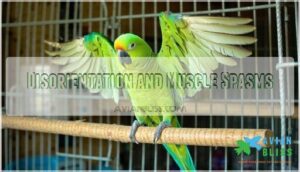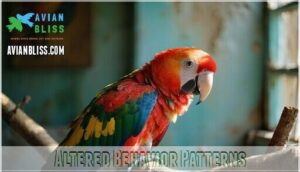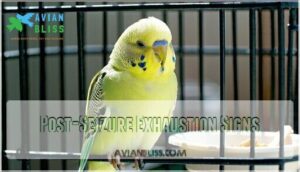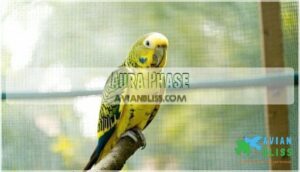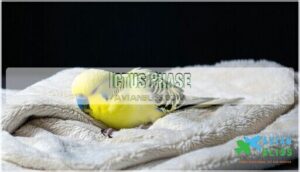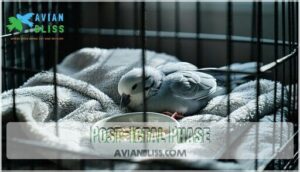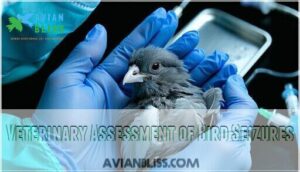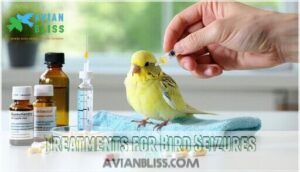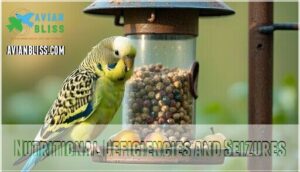This site is supported by our readers. We may earn a commission, at no cost to you, if you purchase through links.
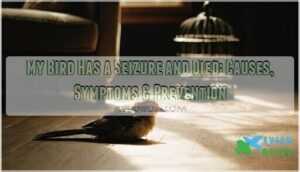 When your bird has a seizure and dies, it’s devastating and often happens without warning.
When your bird has a seizure and dies, it’s devastating and often happens without warning.
Seizures in birds typically stem from brain disorders, toxic exposure, infections, or nutritional deficiencies that may have been building silently.
Common culprits include lead poisoning, vitamin deficiencies, overheating, or diseases like Newcastle virus.
You might’ve noticed subtle signs beforehand—disorientation, unusual behavior, or balance issues—but seizures can strike seemingly healthy birds too.
The tragedy is that many underlying causes are preventable with proper diet, safe environments, and regular vet checkups.
Understanding what triggers these neurological episodes can help you protect other feathered family members from facing the same heartbreaking fate by taking preventive measures such as avoiding toxic exposure and ensuring a balanced diet to prevent nutritional deficiencies.
Table Of Contents
- Key Takeaways
- Causes of Bird Seizures
- Symptoms of Seizures in Birds
- Immediate Actions for Bird Seizures
- Veterinary Assessment of Bird Seizures
- Treatments for Bird Seizures
- Primary Disorders Leading to Seizures
- Secondary Disorders Leading to Seizures
- Environmental Stressors Contributing to Seizures
- Nutritional Deficiencies and Seizures
- Infectious Diseases and Seizures
- Frequently Asked Questions (FAQs)
- Can a bird get a seizure?
- What should I do if my bird has a seizure?
- Can a parrot have a seizure?
- What should I do if my avian has a seizure?
- Can dehydration cause seizures in birds?
- What happens if a pet bird dies suddenly?
- What triggers seizures in birds?
- What causes sudden seizures and death?
- What causes a bird to have a seizure?
- What does an epileptic seizure look like?
- Conclusion
Key Takeaways
- You’ll recognize seizure warning signs like disorientation, balance loss, and unusual behavior that often precede the actual convulsions, giving you precious time to act.
- You can prevent most seizures by eliminating toxic hazards like lead paint, zinc hardware, Teflon fumes, and maintaining proper nutrition with balanced pellets instead of all-seed diets.
- You must contact an avian veterinarian immediately during seizures since quick intervention with anticonvulsant medications can mean the difference between recovery and death.
- You should create a stress-free environment with stable temperatures, proper ventilation, and regular vet checkups to catch underlying conditions before they trigger fatal neurological episodes.
Causes of Bird Seizures
Bird seizures stem from multiple causes that you should understand to protect your feathered companion.
These episodes can result from infections, toxins, nutritional problems, or environmental stressors that overwhelm your bird’s nervous system, which can lead to seizures.
Infections and Brain Disorders
Infections wreak havoc on your bird’s delicate nervous system.
When harmful pathogens breach the brain’s protective barriers, they trigger dangerous electrical storms that can claim your feathered friend’s life.
Here are five infection-related brain disorders causing avian seizures:
- Viral encephalitis – Brain inflammation from viruses disrupts normal neural pathways
- Bacterial meningitis – Infection of brain membranes creates toxic seizure conditions
- Fungal infections – Opportunistic fungi damage brain tissue and nerve connections
- Brain abscesses – Pus-filled pockets compress healthy neurons, triggering convulsions
- Idiopathic epilepsy – Unknown infectious agents cause recurring seizure episodes
Toxins and Nutritional Imbalances
Toxicity lurks in everyday items that can trigger a bird seizure and potentially cause your bird to die.
Heavy metals like lead and zinc from cage materials or toys create severe neurological damage.
Vitamin deficiencies from seed diets lacking proper nutrition cause dangerous mineral imbalances.
| Toxin Source | Common Locations |
|---|---|
| Lead poisoning | Paint chips, curtain weights, solder |
| Zinc toxicity | Galvanized wire, feeding bowls, clips |
| Toxic plants | Avocado, chocolate, caffeine products |
| PTFE fumes | Overheated nonstick cookware |
Nutritional imbalances from all-seed diets create toxic exposure risks through deficient absorption.
Environmental Stress Factors
Beyond toxic substances, your bird’s surroundings can trigger seizures through environmental stressors. Cage Placement matters—drafty spots and damp conditions weaken birds, making sudden bird death more likely.
Noise Pollution from loud sounds creates chronic stress that affects bird health. Poor Air Quality from Teflon cookware releases deadly fumes. Toxin Exposure isn’t just about what they eat—it’s what they breathe.
Consider these environmental stressors that contribute to bird seizure episodes:
- Overcrowded living spaces increase anxiety
- Frequent cage moves disrupt their sense of security
- Temperature fluctuations stress their systems
- Chemical cleaners near their habitat
- Secondhand smoke contamination
Stress Reduction requires creating a stable, quiet sanctuary for your feathered friend.
Symptoms of Seizures in Birds
Recognizing seizure symptoms in your bird can help you act quickly during a medical emergency.
You’ll notice distinct behavioral changes, physical movements, and recovery patterns that signal your pet needs immediate veterinary attention.
Disorientation and Muscle Spasms
When seizures strike, you’ll notice your bird’s world turning upside down.
Your bird’s balance shatters in an instant—seizures flip their world into chaos.
Disorientation hits first—your feathered friend loses coordination and tumbles from perches during falling incidents.
Muscle spasms follow, ranging from subtle tremors to violent convulsions depending on seizure severity.
Different spasm types affect birds uniquely: some experience stiffening, others jerky movements.
Vocal changes accompany these episodes—unusual screeching or complete silence.
Bird seizures can escalate quickly, and without proper intervention, sudden bird death may occur, leaving owners devastated by the unexpected loss due to sudden bird death and the resulting unexpected loss.
Altered Behavior Patterns
Beyond physical seizure signs, altered behavior patterns reveal your bird’s neurological distress.
Subtle changes include unusual restlessness, unexpected vocalizations, and loss of balance before episodes occur. Frantic behavior patterns indicate underlying bird neurological issues requiring immediate attention.
- Social withdrawal – your once-chatty companion suddenly goes quiet
- Aggressive outbursts – gentle birds becoming territorial without warning
- Repetitive movements – circling, pacing, or head-tilting behaviors
These bird behavior changes signal avian health emergency situations that shouldn’t wait.
Post-Seizure Exhaustion Signs
When your bird’s seizure ends, the real worry begins as postseizure exhaustion sets in.
Your feathered friend will likely show lethargy duration lasting several hours, appearing drowsy and unsteady.
Confusion severity varies—some birds seem mildly disoriented while others act completely lost in familiar surroundings.
Appetite loss is common, with birds refusing their favorite treats.
Weakness management becomes essential as wobbly legs struggle to grip perches properly.
The recovery timeline differs for each bird, but most regain normal behavior within 24 hours.
Document these bird seizure symptoms carefully, as repeated episodes worsen outcomes and sadly, some birds don’t survive severe seizures.
Immediate Actions for Bird Seizures
When you notice your bird having a seizure, your immediate response can make the difference between recovery and tragedy.
Understanding the three distinct phases of seizures helps you provide appropriate care and know when emergency intervention is critical.
Aura Phase
Subtle Changes often serve as your bird’s early warning system during the aura phase. Early Detection through careful Owner Observation can prevent severe bird seizure symptoms.
Watch for these Behavioral Signs in the Pre-Ictal State:
- Sudden restlessness or pacing
- Unusual vocalizations or silence
- Head tilting or eye movements
- Loss of balance on perches
- Unexplained fear or anxiety
These bird convulsions precursors typically last minutes before the ictus phase begins. Create a calm environment immediately when spotting these seizure symptoms. Note that vocalization pattern changes can indicate pain.
Ictus Phase
During the ictus phase, your bird experiences involuntary muscle activity and loss coordination.
You’ll notice tonic (rigid), clonic (jerking), or myoclonic seizures lasting typically five to twenty seconds (ictus duration).
Bird convulsions may include vocalizations and beak clenching.
Pet bird seizure symptoms appear dramatic, but stay calm. Remove hazards immediately and avoid restraining your bird during these seizure symptoms.
Post-Ictal Phase
When your bird’s seizure ends, the postictal phase begins—think of it as your feathered friend’s brain hitting the reset button.
This recovery period requires careful monitoring and patience.
- Lethargy Duration: Expect confusion and exhaustion lasting minutes to hours as brain function gradually returns to normal.
- Confusion Management: Create a quiet, dimly lit environment while watching for neurological deficits that might indicate permanent damage.
- Appetite Recovery: Monitor eating habits closely, as appetite loss often signals ongoing neurological complications requiring immediate veterinary attention.
You may need to find resources for specialized bird products to aid in recovery.
Veterinary Assessment of Bird Seizures
When your bird has a seizure, quick veterinary assessment can make the difference between life and death.
Your vet will immediately examine your bird’s history, weight, and physical condition while potentially administering emergency medication to stop the seizure and begin thorough diagnostic testing to save a life with emergency care.
History, Weight, Physical Exam
Once you’ve taken immediate action during your bird’s seizure, your veterinarian will begin a thorough assessment.
Anamnesis Details about recent changes help identify triggers, while Weight Trends reveal nutritional problems.
Through careful Palpation Findings and Neurological Assessment, vets spot underlying health issues that causes of bird seizures.
These Initial Observations guide diagnostic testing to prevent avian death causes before your bird died.
Ensuring proper handling can prevent further harm, so consider using safe handling techniques during transport.
Medication to Stop Seizure
Once your vet completes the examination, immediate drug administration becomes the priority.
Emergency protocols guide their choice of anticonvulsant medications for treating bird seizures:
- Diazepam: Rapid IV/intranasal delivery stops seizures within minutes
- Phenobarbital: Loading doses for severe cases, requiring careful monitoring
- Levetiracetam: Safer long-term management with minimal medication side-effects
- Midazolam: Quick intramuscular action for status epilepticus
Dosage adjustments depend on your bird’s species and seizure severity.
Diagnostic Testing
Three key diagnostic tests help identify what’s causing your bird’s seizures.
Blood chemistry and serology testing reveal infections, toxins, and metabolic imbalances that trigger neurological damage.
Imaging techniques like X-rays spot internal problems, while EEG exams measure brain activity under anesthesia.
Fluid analysis may detect underlying bird health problems causing sudden death.
Treatments for Bird Seizures
Once your avian veterinarian completes their assessment, they’ll develop a thorough bird seizure treatment plan suited to your feathered companion’s specific needs.
Treatment options vary depending on the underlying cause but typically include several approaches working together.
Your vet might prescribe anticonvulsant medications like phenobarbital or levetiracetam to control seizure activity.
Antiseizure medications help stabilize your bird’s nervous system and reduce episode frequency.
Supportive therapy, including fluid administration and vitamin supplements, addresses immediate health concerns while your bird recovers.
A key element in preventing future episodes is calcium supplementation to address potential deficiencies.
Treatment success depends on several factors that’ll tug at your heartstrings:
- Your bird’s age and overall health condition
- How quickly treatment begins after the first seizure
- Whether the underlying cause can be identified and treated
- Your dedication to following the prescribed medication schedule
- Creating a stress-free environment that promotes healing
Dietary changes often play a vital role in seizure management.
Your vet may recommend switching from high-carbohydrate seed diets to balanced pellets, reducing atherosclerosis risk.
In severe cases involving brain tumors, surgery options might be necessary.
Home care becomes your daily responsibility, involving medication administration and monitoring your bird’s behavior for changes.
Primary Disorders Leading to Seizures
Primary disorders directly affect your bird’s brain and nervous system, creating the conditions that trigger seizures.
These serious medical conditions include brain tumors that press on neural tissue, infections like avian influenza that cause brain inflammation, heatstroke from poor ventilation, vascular events from clogged arteries, and head trauma from accidents, which are all serious conditions.
Tumors
Brain tumors represent up to 12% of primary disorders causing bird seizures and bird loss.
These intracranial masses compress neural tissue, triggering generalized seizures that worsen over time.
Middle-aged and older birds face higher risks, and tumor location determines severity—brain tumors cause the most devastating symptoms.
Growth rate affects treatment options, from surgical removal to supportive care, unfortunately, tumor prevention remains limited in avian medicine.
Infections
Infectious diseases pack a serious punch in regards to triggering seizures in your feathered friend.
Viral encephalitis, bacterial meningitis, and fungal infections can inflame brain tissue, while parasitic infections like migrating worms invade neural pathways.
Systemic infections including avian botulism, psittacosis, and Borna virus often lead to neurological complications.
Prompt veterinary care helps identify the specific pathogen and start appropriate treatment before it’s too late.
Heatstroke
Unlike infections that attack the brain directly, heatstroke creates a different crisis for your bird.
When temperatures exceed 104°F, hyperthermia disrupts brain function and can trigger fatal seizures.
Recognizing Signs of heat-related bird illness:
- Excessive panting with wings drooped away from body
- Loss of coordination and inability to perch properly
- Rapid collapse followed by seizure activity
Immediate Cooling Methods and Shade Provision are critical – move your bird to ventilation strategies that include air conditioning or fans.
Hydration Importance can’t be overstated during recovery from heatstroke episodes.
Vascular Events
Vascular events like strokes and blood clots create serious stroke risk for your feathered friend.
Brain atherosclerosis from high-carb diets forms arterial plaques that block blood flow, triggering seizures.
Poor cardiovascular health leads to cerebral infarction, causing sudden collapse and persistent convulsions, which substantially increase bird mortality rates, making immediate veterinary intervention critical for bird passing away prevention.
Trauma
Physical trauma ranks among the top causes of seizures in birds, with head trauma from falls or cage collisions accounting for up to 15% of emergency cases.
Your bird’s fall injuries can create brain swelling and bleeding risks, while fracture complications may worsen neurological damage.
Even minor accidents can trigger seizures hours later, affecting your pet’s quality of life and potentially leading to bird mortality if untreated.
Secondary Disorders Leading to Seizures
While primary disorders directly affect your bird’s brain, secondary conditions create seizures through indirect pathways that disrupt normal body functions.
These underlying health issues—from reproductive stress to metabolic imbalances—can trigger seizure activity even when the brain itself appears healthy, often due to issues like reproductive stress.
Reproductive Problems
Female birds face unique reproductive challenges that can trigger seizures through complex hormonal cascades. Egg binding stands as the most dangerous culprit, creating metabolic chaos when eggs can’t pass naturally.
- Dystocia causes include poor nutrition, calcium deficiency, and overbreeding stress
- Hormonal imbalance during laying cycles disrupts neurological stability substantially
- Egg peritonitis from ruptured eggs creates toxic internal inflammation
- Genetic disorders increase seizure susceptibility in certain breeding lines
Metabolic Disorders
When your bird’s organs struggle to function properly, metabolic disorders become silent culprits behind seizures.
Liver disease disrupts toxin processing, while kidney disease creates dangerous electrolyte imbalances.
Hypoglycemia from inadequate nutrition starves the brain of essential glucose, and calcium imbalances throw off nerve signals.
Atherosclerosis blocks essential blood flow to brain tissue, triggering convulsions, often due to silent culprits.
Nutritional Deficiencies/imbalances
Poor nutrition wreaks havoc on your bird’s neurological system, triggering dangerous seizures.
Vitamin deficiencies and mineral imbalances from inadequate seed diets create the perfect storm for metabolic disorders.
Critical nutritional deficiencies include:
- Vitamin B and E deficiencies – Essential for proper brain function and nerve health
- Calcium deficiency (hypocalcemia) – Causes dangerous muscle spasms and seizures
- Blood sugar crashes (hypoglycemia) – Triggers immediate seizure activity in starved birds
Toxic Events
Toxic events can trigger sudden seizures in your feathered friend.
Heavy metals like lead from stained glass or zinc from galvanized wire pose serious threats. Teflon fumes, household plants, insecticides, and chemical exposure create dangerous environments.
Your bird’s curious nature makes toxic ingestion likely—they’ll chew anything within reach.
To mitigate this risk, consider purchasing safe metal alternatives for your bird’s cage and toys.
Toxin exposure requires immediate veterinary attention and toxicology screening to save your bird’s life.
Ingestion of Lead/zinc
Lead and zinc poisoning ranks among the most dangerous heavy metal toxicity cases in birds.
These metals accumulate in tissues, causing severe neurological damage and seizures.
Common Lead Sources:
- Cage Materials – Older cages, toys, and hardware containing lead-based paints or soldering
- Household Items – Stained glass, fishing weights, curtain weights, and costume jewelry
- Environmental Exposure – Paint chips, plumbing materials, and contaminated soil near homes
Zinc toxicity often occurs from galvanized wire, hardware cloth, or pennies minted after 1982.
Both toxic ingestion scenarios require immediate chelation therapy to bind and remove heavy metals from your bird’s system before permanent damage occurs.
Environmental Stressors Contributing to Seizures
Your bird’s environment plays a vital role in seizure prevention, as stress from temperature extremes and poor housing conditions can trigger dangerous episodes.
Overheating from inadequate ventilation or exposure to drafts and dampness creates physical stress that overwhelms your bird’s nervous system, potentially leading to fatal seizures.
Hyperthermia
Extreme temperature conditions create dangerous thermoregulation failure scenarios that can rapidly spiral into life-threatening emergencies.
When heat overwhelms your bird’s natural cooling mechanisms, heatstroke prevention becomes critical to avoid seizures and potential death.
Birds can’t sweat like humans, making them vulnerable to overheating in stuffy rooms or direct sunlight.
Watch for panting, drooped wings, and lethargy—these signal immediate danger.
Dehydration risk compounds the problem, making seizures more likely as bird stress escalates.
Quick cooling techniques include moving your pet to shade, providing fresh water, and using gentle air circulation.
Never use ice-cold water, which causes shock.
Temperature monitoring prevents these emergencies before they start.
Bird seizure causes often trace back to environmental factors you can control with simple immediate measures.
Damp and Drafty Housing
Beyond just keeping your bird’s living space clean, the quality of their bird environment plays a vital role in bird health. Damp conditions create the perfect breeding ground for mold, and Mold Exposure can trigger serious respiratory issues that stress your bird’s nervous system.
When Humidity Effects combine with poor Airflow Control, your feathered friend’s immune system takes a hit, making seizures more likely. A bird cage dehumidifier can help regulate moisture levels.
Drafts might seem harmless, but they disrupt Temperature Regulation and create chronic bird stress. Think of it like living in a house with broken air conditioning—constantly uncomfortable and exhausting.
Smart Cage Placement away from windows, vents, and high-traffic areas helps maintain stable conditions. Focus on proper ventilation without creating direct airflow over the cage.
Your bird safety depends on consistent temperature and humidity levels. A comfortable bird is a healthier bird, and addressing these environmental factors substantially reduces seizure risk while supporting overall bird care.
Nutritional Deficiencies and Seizures
When your bird experiences seizures, nutritional deficiencies often play a significant role in triggering these frightening episodes.
Poor diet choices or inadequate nutrition can create dangerous imbalances that directly affect your bird’s nervous system, making seizures more likely to occur.
Vitamins B or E Deficiency
Poor nutrition hits your bird’s nervous system hard.
Vitamin B Complex deficiencies disrupt nerve transmission, while lacking Vitamin E Sources reduces antioxidant protection for brain cells.
These Deficiency Symptoms include tremors and coordination loss.
The Neurological Effects can escalate to seizures if untreated.
Smart Dietary Adjustments with fortified pellets and fresh foods prevent these dangerous nutritional gaps.
Providing natural sunlight exposure can also help prevent deficiencies.
Hypocalcaemia
Calcium deficiency frequently triggers dangerous bird seizures, especially during egg laying when calcium absorption becomes critical.
African Grey parrots are particularly vulnerable to hypocalcemia-induced seizures.
Key factors in calcium-related seizures:
- Dietary calcium imbalance – All-seed diets lack sufficient calcium for proper neurological function
- Egg laying stress – Female birds deplete calcium reserves rapidly during reproduction cycles
- Supplementation risks – Over-supplementing can block absorption of other essential minerals
- Calcium absorption issues – Vitamin D3 deficiency prevents proper calcium utilization
Contact your avian veterinary professional immediately if you notice seizure symptoms, as calcium deficiency requires urgent treatment to prevent fatal complications in pet bird health.
Hypoglycemia
When your bird’s blood sugar drops too low, seizures can strike without warning.
This dangerous condition affects small parrots and passerines most severely due to their rapid metabolism.
| Aspect | Signs | Action |
|---|---|---|
| Causes | Fasting, illness, delayed feeding | Monitor feeding schedule |
| Symptoms | Collapse, seizure activity, weakness | Seek immediate vet care |
| Treatment | Glucose administration, supportive care | Professional intervention required |
| Prevention | Regular meals, balanced diet | Consistent nutrition plan |
Hypoglycemia occurs when birds can’t access food for several hours, making pet bird care essential for avian health.
Your avian veterinarian can diagnose this through blood tests and provide immediate glucose treatment to halt seizure progression and restore normal behavior.
Folic Acid Deficiency
Why does your bird need folic acid? This essential nutrient supports DNA synthesis in neural tissues, preventing developmental abnormalities and seizure susceptibility.
Folic Acid Sources like leafy greens are important – Deficiency Symptoms include uncoordinated movement and convulsions.
Without proper Dietary Absorption, Neurological Impact worsens markedly. While Supplementation Risks exist, balanced nutrition prevents tragic outcomes requiring bird memorial considerations.
Infectious Diseases and Seizures
Several infectious diseases can trigger seizures in your bird by causing inflammation in the brain and nervous system.
These conditions range from bacterial infections like psittacosis to viral diseases such as Newcastle disease, making prompt veterinary diagnosis essential for your pet’s survival.
Avian Botulism
Thousands of waterfowl die annually from avian botulism, a devastating bacterial infection that strikes when birds consume contaminated water or maggots carrying deadly toxins.
This silent killer causes rapid paralysis and seizures, making prevention your best defense.
Critical Prevention Strategies:
- Botulism Transmission – Keep birds away from stagnant, contaminated water sources
- Toxin Types – Avoid areas with decaying organic matter where bacteria thrive
- Paralysis Effects – Watch for sudden weakness and neurological symptoms
- Waterfowl Impacts – Recognize mass die-offs signal environmental contamination
- Prevention Strategies – Provide clean, fresh water and maintain proper sanitation
Psittacosis
Unlike botulism’s rapid progression, psittacosis develops more gradually in your feathered friend. Chlamydia psittaci causes this bacterial infection, creating zoonotic risk for humans too.
You’ll notice respiratory distress before neurological symptoms like seizures emerge in 30% of cases.
| Aspect | Details |
|---|---|
| Psittacosis Transmission | Direct contact with infected bird secretions |
| Early Signs | Lethargy, conjunctivitis, breathing difficulties |
| Neurological Phase | Tremors, ataxia, potential convulsions |
| Bird Seizure Diagnosis | Fecal testing, cloacal swabs, blood work |
| Antibiotic Treatment | Early intervention prevents fatal outcomes |
Psittacosis Prevention requires quarantining new birds and maintaining clean environments.
Bird veterinary care becomes critical when your sick bird shows combined respiratory and neurological signs, as bird diseases like this progress quickly without proper bird pathology assessment.
Borna Virus
Through infectious disease transmission, Borna virus attacks your bird’s nervous system, causing devastating neurological symptoms.
This aggressive pathogen leads to proventricular dilatation disease, affecting up to 70% of infected birds with seizures and ataxia.
Borna transmission occurs through direct contact with contaminated secretions.
Consider these sobering facts about Borna prognosis:
- No curative treatment exists for infected birds
- Neurological issues progress rapidly despite veterinary care
- Symptoms include muscle tremors and status epilepticus
Borna prevention requires strict biosecurity measures and quarantine protocols for new birds.
Newcastle Disease
Newcastle disease creates havoc in your feathered friend’s life, causing seizures that can lead to sudden death.
This highly contagious virus spreads through respiratory droplets, affecting up to 100% of unvaccinated flocks with devastating Newcastle Symptoms and significant Economic Impact.
Prevention Strategies include:
- Quarantine new birds for 30 days before introducing them
- Maintain strict hygiene in housing and feeding areas
- Vaccinate regularly following your veterinarian’s schedule
- Monitor health signs daily for early detection
Migrating Parasites
How do migrating parasites wreak havoc on your bird’s nervous system? These invasive organisms travel through your pet’s body, causing organ damage and triggering seizures.
Baylisascaris procyonis, the raccoon roundworm, poses significant zoonotic risk to both birds and humans.
Prevention methods include maintaining clean environments and avoiding raccoon-contaminated areas. Treatment options remain limited once neurological symptoms appear, making bird emergency care essential.
Early detection improves outcomes for bird health when addressing these parasitic threats.
Frequently Asked Questions (FAQs)
Can a bird get a seizure?
Yes, birds can definitely get seizures. They’re caused by infections, toxins like lead or zinc, nutritional deficiencies, brain tumors, trauma, or metabolic disorders that affect their nervous system’s electrical activity.
What should I do if my bird has a seizure?
Don’t panic—staying calm helps you help your bird effectively. Keep the area quiet, remove hazards, don’t restrain them, and contact an avian veterinarian immediately for proper diagnosis and treatment.
Can a parrot have a seizure?
Absolutely, parrots can have seizures from various causes including toxin exposure, nutritional deficiencies, infections, brain tumors, or head trauma. You’ll notice muscle spasms, loss of coordination, and disorientation during episodes.
What should I do if my avian has a seizure?
Keep calm and create a safe, quiet environment. Don’t handle your bird during the seizure. Contact an avian veterinarian immediately for emergency care and proper diagnosis of underlying causes.
Can dehydration cause seizures in birds?
Dehydration can trigger seizures in your bird by disrupting electrolyte balance and brain function.
When fluid levels drop, sodium and potassium imbalances affect nerve transmission, potentially causing neurological symptoms including seizures.
What happens if a pet bird dies suddenly?
Sudden bird death requires immediate veterinary attention to determine the cause and prevent spread of potential disease.
You’ll need to handle the body safely, document symptoms, and consider necropsy for answers.
What triggers seizures in birds?
Coincidentally, seizures in birds often stem from the same culprits that threaten their daily lives.
You’ll find toxins like lead and zinc, nutritional deficiencies, infections, brain disorders, and environmental stressors commonly trigger these frightening episodes in your feathered companion, which can be caused by infections.
What causes sudden seizures and death?
Toxic exposure to heavy metals, severe infections, brain tumors, heatstroke, or metabolic crises like hypoglycemia can trigger fatal seizures. You’ll need immediate veterinary care to identify underlying causes.
What causes a bird to have a seizure?
Lead poisoning from old paint chips triggered seizures in a rescued cockatiel last month.
Your bird’s seizures can stem from toxins like heavy metals, infections, nutritional deficiencies, brain tumors, or trauma.
What does an epileptic seizure look like?
You’ll notice your bird losing coordination and falling from perches, followed by muscle stiffening, jerking movements, and possible vocalizations. The seizure typically lasts 5-20 seconds with temporary unconsciousness.
Conclusion
Like a smoke alarm with dying batteries, subtle warning signs often precede tragedy—but when my bird has a seizure and died, you’re left wondering what went wrong.
Preventing future losses starts with understanding the root causes we’ve discussed. Regular veterinary checkups, proper nutrition, and toxin-free environments form your bird’s safety net.
You can’t reverse what happened, but you’ve gained knowledge to protect other feathered companions from neurological crises that claim too many avian lives unexpectedly.

